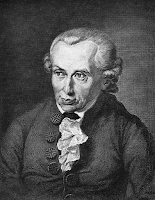Yung Suk Kim
Kant's perspicacious analysis of human capacity and limitations is notable. As a pioneer of modern philosophy, he sees in humans both the power of reason and its limitations. Reason-based, duty-driven, universal law is remarkable in that we may bring about change for all human beings universally. His vision is idealistic, yet we cannot ignore his passion for the universal significance of ethics. Kant also argues that we are limited beings who can understand or perceive only things as they appear to them. He distinguishes between noumenon ("the thing-in-itself") and phenomenon ("the thing as it appears to an observer"). The former is unknowable by humans while the latter is perceived. If we recognize this difference and walk a tightrope between the two, we are "modern."
Understood this way, postmodernity, if it exists at all, is not a blow to the Kantian modern sensibility. Instead, it is an heir to modern philosophy in ways that we can embrace lofty standards of universal law coupled with self-critical observations about our world.
Likewise, in biblical interpretation, we can distinguish between the knowable and the unknowable. The former is a rough representation of reality reflected in ancient texts, communities, societies, and empires. Otherwise, reality itself is unknowable. So, what we need is a humble spirit as well as a critical mindset.

